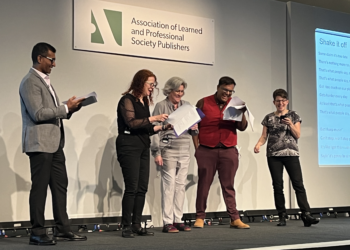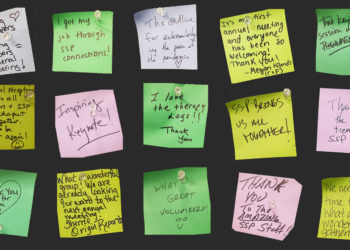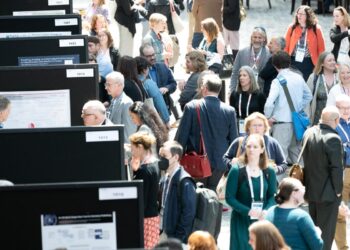Editor’s Note: Today’s post is by Sharon Mattern Büttiker. Sharon is Vice Presodent of Publisher Relation and Content Strategy at Research Solutions, Inc.
The Manchester sound emanating from the 2024 ALPSP (Association of Learned and Professional Scholarly Publishers) conference was an upbeat rhythm of influencers and changemakers. As a new ALPSP member and first-time attendee, I was wide-eyed and ready for the first set.

Jake Okechukwu Effoduh opened with the Keynote, Scholarly Publishing in the Era of Open Access and Generative AI. Assistant Professor at Lincoln Alexander School of Law, Toronto Metropolitan University, Jake shared his experience teaching technology law through the lens of growing up in a community where books were scarce and shared until bindings broke. He read whatever he could get his hands on, which meant a large part of his youth was spent reading and rereading a British book on nutrition. To this day, Jake artfully weaves culinary metaphors into his legal arguments.
Another reality for Jake was that achieving success meant self-funding research until it became acknowledged by a higher funding body. His efforts were recognized when he became a designated Queen Elizabeth Scholar and later a World Economic Forum Expert on Human Rights. Jake holds two master’s degrees in international law from the University of Oxford (UK) and York University (Canada). Jake spoke from experience on both sides of the hemisphere on OA and GenAI.
Simply Red
Jake emphasized that we must confront a sovereign reality of access inequity. Nearly half of the world population remains offline, with nearly 80% living in low-income countries. No matter how “open” research becomes, without electricity and infrastructure access to knowledge will remain inequitable.
New Order
Our keynote speaker did not purport to have the answer to the GenAI question, but he addressed the opportunity clearly and succinctly. “Proliferation of GenAI has blurred the lines between what is fact, what is fiction, what is human, what is machine. We find ourselves asking the questions what journals do we trust? What literature is credible? This presents an opportunity for publishers, editors, and scholarly institutions to assert their longstanding role of gatekeepers and authenticators of what is scholarly knowledge to certify and accredit research output – to champion a gold standard for knowledge dissemination.” Jake asserted, “This is the moment to reinforce your role as knowledge custodians.” He offered the following pointers. Use AI, but:
- Scrutinize AI tools to ensure they offer real benefits and are not just unproven, flashy products
- Ensure GenAI adoption undergoes human validation of output and supervision through careful implementation across publishing workflows
- Pay attention to the ongoing copyright disputes highlighting the tension between AI training on copyrighted content and fair use
- Aim for research output to be included in training data because published works may soon be invisible if they arenot in the training data.
In the spirit of open access and as a response to research access inequity, Jake asked the room to consider this: If we are to publish for the fruits of our research and not get paid, we should not expect publishers to be remunerated for content use in AI works.
Oasis
Although there are many positive aspects of OA, there is no doubt it has put more power to publish in the hands holding the largest financial resources. This power of the purse strings has put an additional strain on smaller publisher who often rely on subscription revenue to sustain their organization or society. In the session later that day, How Smaller Publishers Remain Relevant: Lessons Learned and Best Practices Shared, the panelists Susan King (Executive Director of Rockefeller University Press), Maggie Simmons (Director of Publishing at Geological Society of London), Helen King (Senior Editor at the Royal Irish Academy), and Shehnaz Ahmed (Director of Research and Publishing at British Association of Dermatologists) addressed the challenge of relevancy in an increasingly competitive and budget constrained market. As it turns out, working together is better for science and for publishers.
By sharing resources and expertise, publishers can improve profitability while advancing scientific breakthroughs. (Who knew?) Susan quotes Rachel Burley, where she describes Purpose-Led Publishing in an interview published in The Scientific Observer, “Scholarly publishers have been competing for a long time, but we believe this is self-limiting. We can offer more through collaboration, which increases our value to researchers. No two journals are identical in aims and scope, level of selectivity or readership, making our combined portfolio highly diverse and complementary. Different journals foster distinct academic communities, enhancing engagement and collaboration within and across disciplines. Our motivation to create the coalition centers around the desire to serve our scientific community better by working together more closely to address common challenges.”
The Verve
The session India Rising: How Society Publishers can Prepare for the Coming Surge in Quality Submissions focused on the rapid growth and increasing importance of the India market. Kevin Lomangino (Director, KGL Consulting) set the stage for Kishor Chandra Satpathy (Chief Librarian at Indian Statistical Institute, Kolkata), Akila Sridhar (Deputy Editor, Scientific Reports, Springer Nature), and Chris Reid (Director for Product and Publishing Development at AAAS) to rock the house with facts and insights on the expected growth trajectory of India, barriers faced, and strategies to improve engagement.
Kishor pointed out student enrollment in India has increased 26.5% between 2015 – 2022 with female enrollment up by 31% in the same period. Publishers can tap into this growing market by paying more attention to local and regional colleges, whereas currently institutions of national or reputational importance attract the attention of publishers. Private investment in Indian research and institutions is also on the rise The One Nation One Subscription (ONOS) model negotiations are currently limited to government institutions, adding private institutions in planned at a later phase. Publishers can take up negotiations with private institutions separately today to secure interest in their portfolios.
Akila shared her compilation of the face of Indian research communities. While publication of Indian of research is rising, the use of Indian research is not rising at the same level as, for example, China. Historically, education in India is deeply technical and focused on medicine and engineering. Efforts to expand to other disciplines is ongoing through new education tracks and funding. Akila’s work involves creating infrastructure to encourage high quality research output in various disciplines, from snakebite therapies to aerospace. Editors do the legwork of educating authors on precise articulation and the creation of quality over quantity.
Chris outlined AAAS’ approach to India by first looking at China. Quoting Mark Twain, “History doesn’t repeat itself, but it often rhymes.” India’s scholarly publication growth rate is 7.6% annually. While the volume is lower than China and the USA, the market potential is sizable due to the increase in enrollment, which gives rise to an increase in content use, which leads to increased submissions. Building infrastructure to support Indian research submission is key to support the rise of Indian research. The set rounded out with a look at how APCs can support growth. Providing affordable APCs through ONOS, waivers, or other solutions will facilitate sustained growth for Indian research output.
Take That
David Worlock received the ALPSP Award for Contribution to Scholarly Publishing and gave an acceptance speech worthy of a standing ovation. Not a dry eye in the house. The ALPSP Impact Award was presented to JSTOR Access in Prison, with The Forest of Biologists awarded highly commended. The Papermill Alarm received the ALPSP Award for Innovation in Publishing. All nominees were celebrated for their breakthrough performances in driving innovation for the good of scholarly research and publishing. Encore!
The Eras Tour
To round off my list of favs, Heather Staines and her fearless band of ad hoc actors and vocalists added to the playlist with an impressive musical review of publishing through the ages. They were accompanied by Taylor Swift tunes re-written in perfect rhyme and reason for our publisher crowd. Ravi Venkataramani, Heather Staines, Heather Kotula, Jude Perera, and Romy Beard’s mirrorball performance was an impressive alchemy of education and entertainment. Talk about transformative!
Speaking of which, the ALPSP Annual Conference and Awards 2024 had all the right elements to change the trajectory of scholarly research output for the better. I hope this era is publishing’s best one yet!



